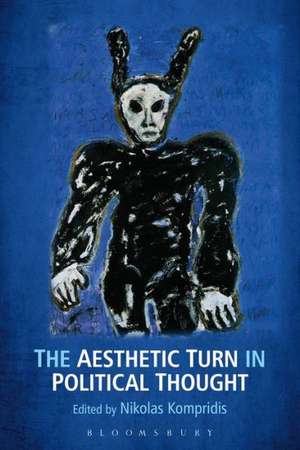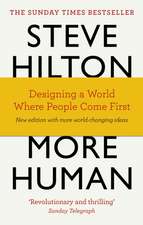The Aesthetic Turn in Political Thought
Editat de Professor Nikolas Kompridisen Limba Engleză Paperback – 4 iun 2014
| Toate formatele și edițiile | Preț | Express |
|---|---|---|
| Paperback (1) | 241.42 lei 43-57 zile | |
| Bloomsbury Publishing – 4 iun 2014 | 241.42 lei 43-57 zile | |
| Hardback (1) | 834.70 lei 43-57 zile | |
| Bloomsbury Publishing – 4 iun 2014 | 834.70 lei 43-57 zile |
Preț: 241.42 lei
Preț vechi: 274.69 lei
-12% Nou
Puncte Express: 362
Preț estimativ în valută:
46.19€ • 48.36$ • 38.22£
46.19€ • 48.36$ • 38.22£
Carte tipărită la comandă
Livrare economică 07-21 aprilie
Preluare comenzi: 021 569.72.76
Specificații
ISBN-13: 9781441148346
ISBN-10: 1441148345
Pagini: 328
Ilustrații: black & white illustrations
Dimensiuni: 152 x 229 x 23 mm
Greutate: 0.54 kg
Editura: Bloomsbury Publishing
Colecția Bloomsbury Academic
Locul publicării:New York, United States
ISBN-10: 1441148345
Pagini: 328
Ilustrații: black & white illustrations
Dimensiuni: 152 x 229 x 23 mm
Greutate: 0.54 kg
Editura: Bloomsbury Publishing
Colecția Bloomsbury Academic
Locul publicării:New York, United States
Caracteristici
Analyzes the aesthetic themes and arguments present in political theory from a variety of perspectives
Notă biografică
Nikolas Kompridis is Research Professor of Philosophy and Political Thought, and Foundation Director of the Institute for Social Justice, Australian Catholic University. He is the author of Critique and Disclosure: Critical Theory between Past and Future (2006) and Philosophical Romanticism (2006).
Cuprins
Turning and returning: the aesthetic turn in political thought NIKOLAS KOMPRIDIS Part I - Aesthetic politics, judgment, and worldly things "Delightful horror": Edmund Burke and the aesthetics of democratic revolution JASON FRANK We feel our freedom: Imagination and judgment in the thought of Hannah Arendt LINDA ZERILLI Arendt, aesthetics, and "the crisis in culture" PATCHEN MARKELL Part II - Poetics, theory, and utopian politics Fanon's decolonial aesthetic LEWIS GORDON Journeys to farther shores: Intersecting movements of poetics, politics and theory beyond utopia LIA HARO AND ROMAND COLES Part III - Receptivity, reinscription, affirmation Recognition and receptivity: Forms of normative response in the lives of the animals we are NIKOLAS KOMPRIDIS For the love of earthly life: Nietzsche and Winnicott between modernism and naturalism MELISSA A. ORLIE Writing a name in the sky: Ranciere, Cavell, and the possibility of egalitarian inscription ALETTA NORVAL Part IV - Aesthetic "seeing as", politics of the "as if" Blankets, screens and projections: Or, the claim of film DAVIDE PANAGIA The aesthetic dimension: Aesthetics, politics, knowledge JACQUES RANCIEREBibliographyIndex
Recenzii
This is an excellent and wide-ranging collection of essays on political theory through a broadly aesthetic approach; that is, an approach that seeks to reintegrate political thought and action with their accompanying senses, emotions and intuitions.
The Aesthetic Turn in Political Thought is an excellent introduction to one of the most important developments in contemporary political theory, with several of the essays charting new theoretical territory.
The Aesthetic Turn in Political Thought is an excellent introduction to one of the most important developments in contemporary political theory, with several of the essays charting new theoretical territory.












